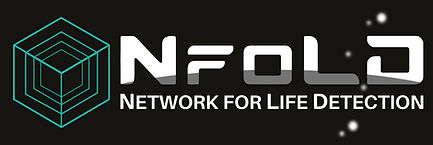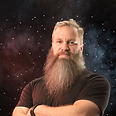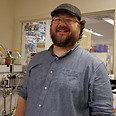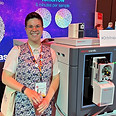
EARLY CAREER COUNCIL

Bonnie Teece
Postdoctoral Fellow
NASA Jet Propulsion Laboratory
ECC Co-Lead
Bonnie Teece has expertise in organic geochemistry, astrobiology, and science education. She received her PhD in Geology from UNSW Sydney, where she researched organic biosignatures through the geological record. Her research has also focused on spectroscopy and hydrothermal environments. Bonnie believes that contextual knowledge is essential for biosignature research, and spends a lot of her time in the field, in places like the Archean rocks in the Pilbara region, Western Australia, and in Yellowstone National Park, USA. Bonnie's professional experience includes working as a Postdoctoral Fellow at the NASA Jet Propulsion Laboratory, where she is currently developing life detection strategies for the INVADER project. She is also an Adjunct Associate Lecturer at the University of New South Wales, Sydney, where she continues to conduct research projects in astrobiology and science education. In addition to her research, Bonnie is passionate about science communication and education. She has worked as an Educator and Learning Developer at the Powerhouse Museum, where she designed and ran a series of space-themed STEAM workshops for primary- school aged students. Bonnie has also demonstrated strong leadership skills as a Project Officer for the Online Learning and Innovation Community of Practice at UNSW Sydney, where she managed a community of over 180 academic and professional staff. Bonnie's technical skills include spectrometry, spectroscopy, and geological techniques such as petrography and micro X-Ray Fluorescence.

Graham Lau
Research Investigator
Blue Marble Space Institute of Science
ECC Co-Lead
Dr. Graham Lau is an astrobiologist and communicator of science. With an academic background spanning biology, chemistry, astrophysics, and geology, Dr. Lau is an expert on how living things effect the environment around them and how we search for alien life beyond the Earth. He’s conducted research in the Canadian High Arctic, has done x-ray spectroscopy at three different particle accelerators around the world, and is the Host of the NASA-funded livestream show called “Ask an Astrobiologist”. Graham currently serves as the Director of Communications and Marketing for the non-profit Blue Marble Space, he’s a Research Scientist with the Blue Marble Space Institute of Science, and he is also the Director of Logistics for the University Rover Challenge (an undergraduate robotics competition focused on Mars rovers). Graham has given public talks to classrooms and student groups from around the world, has been interviewed on various podcasts, and is known for his inspirational views on our place in the cosmos. Dr. Lau also serves as a meditation instructor and public speaking coach.

Bradley Burcar
NASA Postdoctoral Management Program Fellow - NASA HQ
NCOT Lead
Bradley Burcar is a NPMP working for NASA HQ in support of NfoLD and the Laboratory for Agnostic Biosignatures. He received his PhD in Chemistry and Chemical Biology from Rensselaer Polytechnic Institute with his research focused on prebiotic chemistry, specifically the polymerization of information carrying molecules and the creation of organophosphates. Currently he works in conjunction with the ECC to coordinate and plan events, and communicate NfoLD research and activities throughout the network.

Ashley Hanna
PhD Student - University of Maryland
and contractor at NASA Goddard Space Flight Center
ECC Committee
Ashely Hanna's research focuses on the development and optimization of methods for the detection of biosignatures and prebiotic molecules via Laser Desorption/Ionization Mass Spectrometry (LDMS) for space flight instruments.

Osama Alian
PhD Candidate
Michigan State University
ECC Committee
Osama Alian is completing his PhD in the department of Microbiology and Molecular Genetics at Michigan State University with Matt Schrenk, PhD. His research focuses on characterizing and defining the in situ microbe-mineral interactions within deep sea hydrothermal vents and similar environments using an array of methods from bioinformatics and benchtop experiments to spectroscopic and spectrometric techniques. His work aims to develop well defined processes for identifying potential biosignatures and their potential for detection by spaceflight ready instruments for current and future astrobiology relevant missions.

Taylor Plattner
PhD Candidate
Georgia Institute of Technology
ECC Committee
Taylor Plattner is a 5th-year planetary science PhD candidate working with Dr. Britney Schmidt in the Planetary Habitability & Technology Lab. She is interested in the intersections of astrobiology, analog fieldwork, geobiology, and remote sensing. In particular, her work is focused on understanding where potential biomarkers are most likely to be preserved in planetary-analog brine environments, and whether these potential biomarkers are true biomarkers or instead pseudofossils. Her work is essentially modeled after a mock mission—scaling from the orbital to lander and finally to laboratory study— and also inspired by the “ladder of life detection”. Her work will provide insight for future missions to Mars by contextualizing habitability and potential biomarkers that might be present in environments like Gale Crater or Meridiani Planum.
WHO IS 'EARLY CAREER’?
Undergraduates, graduate students, postdoctoral fellows, and early career researchers are all encouraged to join. In the context of this group, ‘early career’ does not correspond to a fixed definition (e.g., within a fixed number of years post-PhD); rather, if an individual self-identifies as ‘early career’ and perceives a benefit to participating in the Early Career Council, that individual is encouraged to join.
MOTIVATION
The purpose of the Early Career council is to foster the development of the next generation of life detection scientists and technologists by providing visibility and engagement in community activities, as well as a forum for identifying and discussing issues specific to early career individuals.
BENEFITS
The intended benefits of participation in the Early Career Council are to foster closer ties with other early career scientists and with a network of researchers pursuing similarly-themed work, to provide enhanced context and visibility for one’s work and ideas, and to access a mechanism designed to raise the profile of issues that are specific or important to early career scientists. The Early Career Council can bring business before the Steering Committee at any time, can propose new NfoLD initiatives, and can propose for any of the enabling resources that NASA makes available to the RCNs. Members of the Early Career Council may also participate in Action Groups and, in that capacity, can propose, lead, or participate in NfoLD initiatives. Additional benefits include:
-
Participation in resource sharing initiatives
-
Access to mailing lists: NfoLD-public, NfoLD-wide, Action group-specific, and Early career-specific (in progress)
-
Access to the NfoLD website as a user (in progress)
-
Listing in NfoLD Life Detection Research Directory (in progress)
As with all NfoLD members, early career members should refer to, and abide by, the guidelines in the NfoLD Rules of the Road when interacting with the NfoLD community in order to maintain a safe, diverse, transparent and productive research environment. Violation of these stipulations will result in disaffiliation.
REQUESTING TO JOIN THE EARLY CAREER COUNCIL
If you are not yet a member of NfoLD, please request affiliate member status here. The affiliate member application form includes an option to request membership on the Early Career Council.
If you are already a member of NfoLD as part of a Steering Committee research project, or have previously obtained affiliate membership status but would now like to join the ECC, please send us an email to indicate your interest.